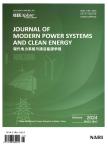Multi-energy Management of Interconnected Multi-microgrid System Using Multi-agent Deep Reinforcement Learning
作者机构:School of Mechanical and Electrical EngineeringUniversity of Electronic Science and Technology of ChinaChengduChina Southwest University of Science and TechnologyMianyangChina Department of Energy TechnologyAalborg UniversityDK-9220 AalborgDenmark
出 版 物:《Journal of Modern Power Systems and Clean Energy》 (现代电力系统与清洁能源学报(英文))
年 卷 期:2023年第11卷第5期
页 面:1606-1617页
核心收录:
学科分类:12[管理学] 1201[管理学-管理科学与工程(可授管理学、工学学位)] 080802[工学-电力系统及其自动化] 0808[工学-电气工程] 08[工学] 081104[工学-模式识别与智能系统] 0835[工学-软件工程] 0811[工学-控制科学与工程] 0812[工学-计算机科学与技术(可授工学、理学学位)]
主 题:Interconnected multi-microgrid system energy management combined heat and power demand response deep reinforcement learning
摘 要:The multi-directional flow of energy in a multi-microgrid(MMG) system and different dispatching needs of multiple energy sources in time and location hinder the optimal operation coordination between microgrids. We propose an approach to centrally train all the agents to achieve coordinated control through an individual attention mechanism with a deep dense neural network for reinforcement learning. The attention mechanism and novel deep dense neural network allow each agent to attend to the specific information that is most relevant to its reward. When training is complete, the proposed approach can construct decisions to manage multiple energy sources within the MMG system in a fully decentralized manner. Using only local information, the proposed approach can coordinate multiple internal energy allocations within individual microgrids and external multilateral multi-energy interactions among interconnected microgrids to enhance the operational economy and voltage stability. Comparative results demonstrate that the cost achieved by the proposed approach is at most 71.1% lower than that obtained by other multi-agent deep reinforcement learning approaches.



